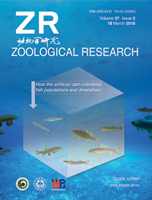
|
Zoological Research
Kunming Institute of Zoology, Chinese Academy of Sciences
ISSN: 2095-8137
Vol. 31, No. 3, 2010, pp. 570-574
|
 Bioline Code: zr10078
Bioline Code: zr10078
Full paper language: Chinese
Document type: Research Article
Document available free of charge
|
|
|
Zoological Research, Vol. 31, No. 3, 2010, pp. 570-574
| en |
Isolation and characterization of Hainantoxin-II, a new neurotoxic peptide from the Chinese bird spider (Haplopelma hainanum)
Jian-Yi, Pan & Zhi-Qiang, Yu
Abstract
Hainantoxin-II (HnTx-II), a novel neurotoxin, was isolated from the venom of the Chinese bird spider (Haplopelma hainanum) by cation exchange chromatography and reverse-phase HPLC. The toxin was a single chain polypeptide with calculated molecular weight of 4 253.135 obtained by mass spectrometry. The complete amino acid sequence of HnTx-II was determined by Edman degradation and found to contain 37 residues with three disulfide bonds. Results showed HnTx-II can reversibly paralyze cockroaches for several hours after intra-abdominal injection with ED50 of 16 μg/g and kill the insects immediately at a dose of 60 μg/g. It was also shown to kill mice at a LD50 value of 1.41μg/g after intracerebroventricular injection. Hainantoxin-II shares 91% sequence homology with Huwentoxin-II (HwTx-II), an insecticidal peptide from another bird spider (Haplopelma schmidti) with a unique scaffold. While HnTx-II and HwTx-II both exhibit toxic activities in insects and mammals, HnTx-II shows higher insecticidal activity and lower lethiferous activity of mammals than HwTx-II. These results help clarify structural-functional relationships of the polypeptide toxin.
Keywords
HnTx-II; Neurotoxin; Insecticidal peptide; Spider venom; Haplopelma hainanum
|
| |
© Copyright 2010 Kunming Institute of Zoology, the Chinese Academy of Sciences
Alternative site location: http://www.zoores.ac.cn/
|
|
